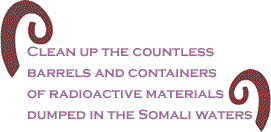
|
|||||||||||||||||||||||

|
|

Custom Search
|
|
 |
|
Make no mistake, the proliferation of piracy in the Somali coast is a serious problem- not only for the international community but for Somalian general, and more specifically, for the current Islamist led government of national unity. After all, Islamic law has zero tolerance for banditry, whether sea-based or land-based. That said: piracy in The partnership would describe itself as the de facto Somali coast guard. It would offer the following reasons for its controversial activities: to prevent the fishing mafia from abusing the Somali sea resource, and to prevent mercenary ships from dumping toxic chemical waste in the Somali waters. Leaders of the partnership would offer interviews to the international media challenging the conventional wisdom that identified their acts as “piracy” and the monies they collect as “ransom.” This claim would not only help present a moral argument in defense of the partnership’s illegal activities, but, it would enable them to score a few public relations points. However; while the grievance that they put in the center stage is real and deserves a serious attention, there is practically zero evidence to indicate that these pirates are driven by altruistic objectives. Meanwhile, the number of high-jacked ships and vessels (commercial or otherwise) and the cost of freeing them and their crews have been escalating. Today, piracy is not only
disrupting international trade, it is preventing the flow of the
humanitarian aid to several million Somalis on the verge of starvation
and is perpetuating the very culture that kept However, the nagging query that most media seem to ignore is: at a time when massive budget cuts became survival necessity for most of the wealthy nations, how could seemingly manageable level of threat logically justify the multi-national deployment of the mightiest navies of the world to engage in much costlier and indeed indefinite endeavor (operation water circus)? How many warships are needed in order to carry surveillance operation on Eyl and Harardheere where all the Somali pirates are based? We are talking about two bone-dry coastal villages in which no rat could find a place to hide. These pirates are not falling off the sky, and it is not like there is a tourist industry that could give the commissioned speedboats anchored along the shores of these two villages the appearance of leisure boats.
With that in mind, clearly
missing out of the piracy discussion is a couple of critical factors:
first, the importance of the Indian Ocean as a premier strategic
region in light of the ‘shifting economic balance of power from
West to East’ and In his insightful essay -
Center Stage for the 21st Century: Power Plays in the Indian
Ocean - Robert D. Kaplan presents a compelling argument that
the power that controls the Kaplan points out that “the
Second is what Phil
Carter, Acting Assistant Secretary for African Affairs, describes
in his speech “U.S. Policy in Africa
in the 21st Century” at The Africa Center for Strategic Studies
last February, “the professionalization of Currently there are three possibilities being considered - reenergizing the Africa Command Center known as AFRICOM which was rejected by all African nations asked to host; providing US Navy escort services, or simply securing lucrative deals for private security contractors such as Blackwater - however, there is only one that is readily available for hire. And under such inevitable scenario, Obama’s foreign policy would be seen as nothing but a continuation of the old bankrupt neocon scheme.
For a solution to the piracy dilemma, the Obama administration should:
There is no military solution to this problem. The military option will only win the pirates more support and sustain the current state of lawlessness. BlackCommentator.com Guest Commentator, Abukar Arman, is a freelance writer whose articles and analyses have appeared in the pages of various media groups and think tanks. Click here to contact Abukar Arman. |
|
Any BlackCommentator.com article may be re-printed so long as it is re-printed in its entirety and full credit given to the author and www.BlackCommentator.com. If the re-print is on the Internet we additionally request a link back to the original piece on our Website. Your comments are always welcome. eMail re-print notice
If you send us an eMail message we may publish all or part of it, unless you tell us it is not for publication. You may also request that we withhold your name. Thank you very much for your readership. |
|
| |
|
| April 30 , 2009 Issue 322 |
|
| Executive Editor: Bill Fletcher, Jr. |
| Managing Editor: Nancy Littlefield |
| Publisher: Peter Gamble |
| Est. April 5, 2002 |
Printer Friendly Version
in resizeable plain
text format or pdf
format. |
| Frequently Asked Questions |
 |

|
 |
 |
 |
| |
| |





























 To
adequately understand the piracy situation would require context
beyond the illegal activities. Albeit, in the past eight years,
America and much of the world were inculcated with an ill-advised
notion that context is obsolete and that the official statement
is all that matters in understanding complex issues such as extremism,
terrorism and indeed piracy. It goes without saying that that
mindset has not only failed to reduce or irradiate any of these
ills, it has, in fact, exacerbated them.
To
adequately understand the piracy situation would require context
beyond the illegal activities. Albeit, in the past eight years,
America and much of the world were inculcated with an ill-advised
notion that context is obsolete and that the official statement
is all that matters in understanding complex issues such as extremism,
terrorism and indeed piracy. It goes without saying that that
mindset has not only failed to reduce or irradiate any of these
ills, it has, in fact, exacerbated them. Meanwhile,
like in the peak of the Cold War era,
Meanwhile,
like in the peak of the Cold War era, 






